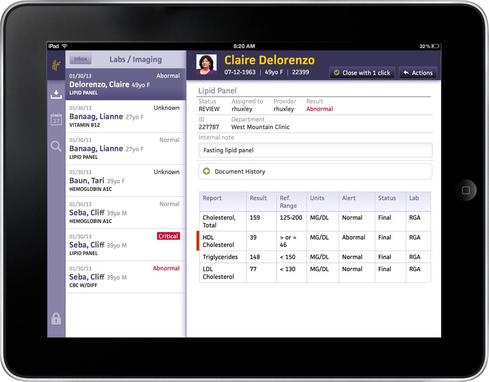Athenahealth offers cloud software, but to call it a healthcare cloud software company misses the point.

If doctors were MBAs instead of (or, in addition to) being MDs, that return on investment calculation would be easy, Coldwell said. "The problem is, physicians and healthcare providers are possibly the worst business people on the planet -- and you can quote me on that. And you can quote me saying, 'you can quote me on that.' " To pick Athenahealth, customers have to accept the argument that the firm can perform many tasks more efficiently than the practice can itself, he said.
[ Related: Athenahealth CEO Jonathan Bush's Quest: A Healthcare Internet.]
Regional Health, which calls itself the largest healthcare provider in western South Dakota, is an example of a client Athenahealth won on the strength of its EHR. The firm previously used the Mysis software that was phased out after Mysis merged with Allscripts in 2009.
Matthew Long, director of innovation and operations for Regional Health, said the first time he saw a presentation from Athenahealth in 2007, he came away thinking he ought to buy stock in the company. But at the time "they were just beginning their travels into EHR" and didn't look like a viable option. A couple of years later, in the wake of an economic downturn that made spending money on software challenging, he took another look and came to a different conclusion. "This was something that didn't require a huge capital investment and actually aligns to our goals -- either everyone succeeds together or everyone fails together," he said.
The cloud applications themselves are good but, compared with consumer technologies, perhaps not quite as slick as Athena makes them out to be. "They're not smartphones yet. They're not intuitive, they're not beautiful to use -- a term the Athena folks like to use," Long said. On the other hand, by nature the cloud software improves day by day and helps Regional Health keep pace with regulatory changes. For example, Athenahealth is helping the firm prepare for the introduction of ICD-10 diagnosis codes.
"We're always on the front edge, and the fact that we don't have to deal with hardware and servers makes me happy," Long said. Maybe more important, he added, "I have a partner in dealing with the revenue cycle -- where it used to be all on me."
Follow David F. Carr on Twitter @davidfcarr or Google+. He is the author of Social Collaboration For Dummies (October 2013).
Though the online exchange of medical records is central to the government's Meaningful Use program, the effort to make such transactions routine has just begun. Also in the Barriers to Health Information Exchange issue of InformationWeek Healthcare: why cloud startups favor Direct Protocol as a simpler alternative to centralized HIEs. (Free registration required.)
About the Author(s)
You May Also Like







